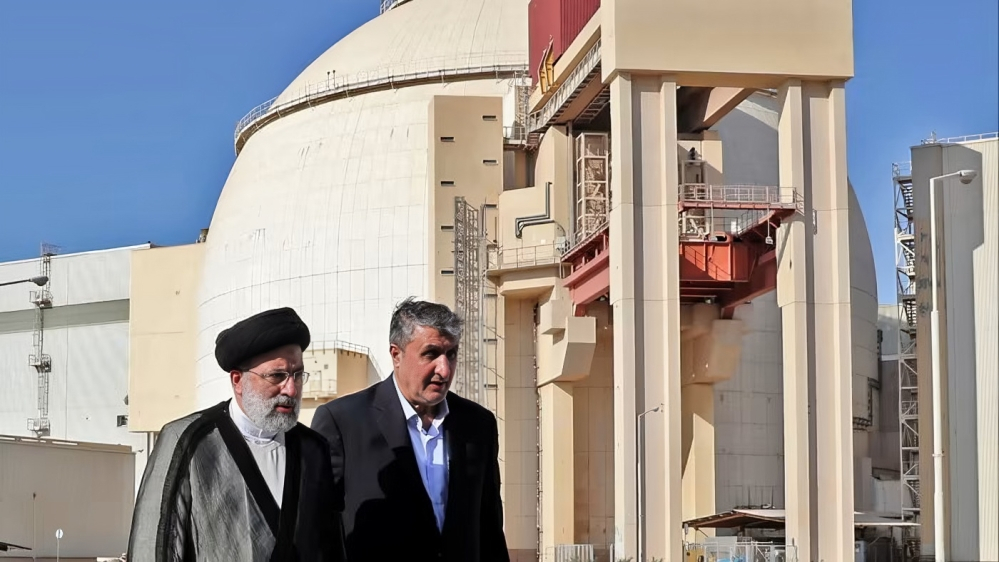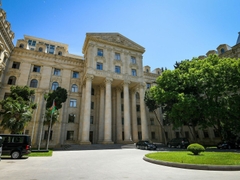The Chief of the Atomic Energy Organisation of Iran (AEOI) said that the country has allowed more than 130 inspectors of the International Atomic Energy Agency (IAEA) to inspect its nuclear sites.
“We have not banned any IAEA inspectors from visiting Iran, and currently, more than 130 of the IAEA inspectors are allowed to inspect nuclear sites in Iran, and on this basis, the inspections of sites in Iran are in progress within the framework of the safeguards agreement,” Mohammad Eslami told reporters on May 1, Tasnim News Agency reported.
He said that Tehran had continued its cooperation with the IAEA, in accordance with the joint statement issued on March 3, 2023, by the Iranian nuclear body and the IAEA.
“We have continuously been engaged in talks and interactions with the IAEA on safeguard issues as agreed, which has involved four sites from the beginning. The issues related to two of the sites have been resolved, and we are in talks about the other two,” he added.
In this joint statement, Iran expressed “its readiness to continue its cooperation and provide further information and access to address outstanding safeguards issues" related to the three locations.
Referring to the upcoming visit by the IAEA Director General Rafael Grossi to Tehran, Eslami said that “we are going to have talks with Mr Grossi, and we are sure that these visits and talks will help in eliminating such doubts and develop relations between Iran and the agency within the framework of the safeguards agreement.”
Grossi will visit Iran to participate in Iran’s first International Nuclear Science and Technology Conference as a speaker in the central city of Isfahan on May 6-8, and to hold meetings with Iranian officials.
Addressing the opening ceremony of Iran's Sixth Export Potential Exhibition on April 27, Iranian President Ebrahim Raisi described the sanctions imposed on Iran, including those on its military and nuclear programs, as “ineffective”.
He underlined that Iran does not pursue nuclear weapons, while saying that Tehran has had the biggest "success" in nuclear and military fields. "Of course, access to nuclear weapons has no place in our military doctrine at all," Raisi added.
In 2003, Iran’s Supreme Leader Ayatollah Ali Khamenei issued a religious decree prohibiting the production of weapons of mass destruction, including nuclear arms.
At a meeting with a group of workers on April 24, the Supreme Leader defended the country's nuclear program, saying that Western sanctions aimed to constrict Iran in order to follow "their colonial and arrogant lines", but the Islamic Republic would "not submit to such pressure".
Khamenei added that the US wanted to "shut down" Iran's nuclear industry and gain control over Iran's "wealth, reputation, and policies".
His comments follow remarks by some Iranian officials made during the recent heightened tensions with Israel, hinting that Tehran was ready to develop a nuclear bomb if needed.
On April 18, the commander of the Islamic Revolutionary Guard Corps (IRGC) unit for the protection and security of Iranian nuclear centres, Brig Gen Ahmad Haqtalab, hinted at the possibility that Iran may accelerate its already-controversial nuclear agenda if an Israeli strike seeks to slow it down.
An Iranian hardline MP, Javad Karimi Qoddousi, said on April 22 that there was only "a one-week gap from the issuance of the order to the first test" of a nuclear bomb.
These remarks came amid speculations that Israel could be readying for a direct strike on Iran, including on its key nuclear facilities, as it mulls a response to the April 13 Iranian drone and missile attack.
Expressing concerns about Iran's nuclear program, on April 15, the IAEA chief said that Iran's accumulation of nuclear material, which is "almost at weapons-grade level", raises questions internationally. However, Grossi noted the absence of evidence suggesting there is a nuclear weapons program in Iran.
After the US withdrew from the nuclear deal in May 2018, Iran began gradually increasing its uranium enrichment. In 2022, the IAEA Board of Governors censured Iran twice over its alleged lack of cooperation with the agency's safeguards probe.
In reaction to the first censure resolution, Iran removed monitoring equipment from several nuclear sites – including cameras – in June 2022. Following the second censure resolution in November of the same year, Iran increased the enrichment of uranium to 60% at the Fordow nuclear site.







 The Foreign Ministry of Azerbaijan has rejected a claim by French Interior Minister Gérard Darmanin on Baku’s alleged meddling in New Caledonia’s p...
The Foreign Ministry of Azerbaijan has rejected a claim by French Interior Minister Gérard Darmanin on Baku’s alleged meddling in New Caledonia’s p...
 Azerbaijan Railways (ADY) has successfully completed the reconstruction of the cargo yard located in the Astara region of Azerbaijan to ensure the ...
Azerbaijan Railways (ADY) has successfully completed the reconstruction of the cargo yard located in the Astara region of Azerbaijan to ensure the ...
 Turkmenistan's Foreign Minister Rashit Meredow and EU's Special Representative for Central Asia Terhi Hakala have discussed prospects for cooperati...
Turkmenistan's Foreign Minister Rashit Meredow and EU's Special Representative for Central Asia Terhi Hakala have discussed prospects for cooperati...
 In a high-profile trial that has gripped the nation, Kuandyk Bishimbayev, Kazakhstan’s former economy minister, has been sentenced to 24 years in p...
In a high-profile trial that has gripped the nation, Kuandyk Bishimbayev, Kazakhstan’s former economy minister, has been sentenced to 24 years in p...
 Foreign Minister of Azerbaijan Jeyhun Bayramov met with his Armenian counterpart Ararat Mirzoyan in Almaty, Kazakhstan, to negotiate the peace agenda.
Foreign Minister of Azerbaijan Jeyhun Bayramov met with his Armenian counterpart Ararat Mirzoyan in Almaty, Kazakhstan, to negotiate the peace agenda.



